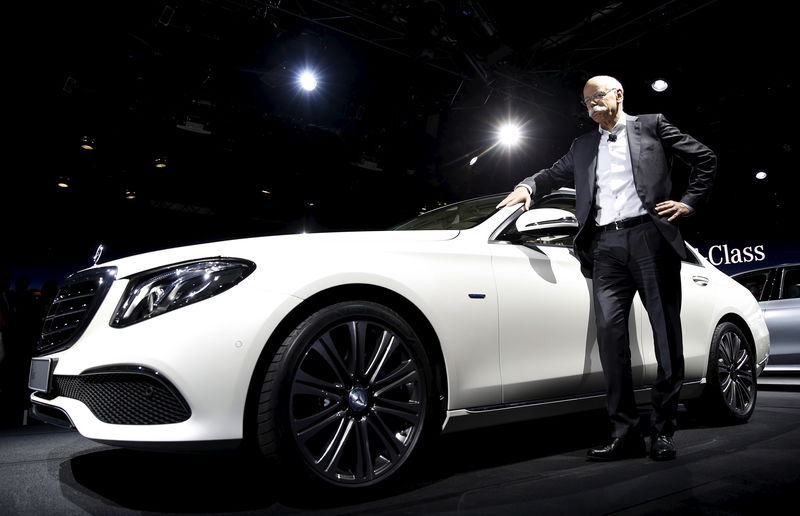By David Shepardson and Paul Ingrassia
DETROIT (Reuters) - When U.S. President Barack Obama visits Detroit's annual auto show on Jan. 20, exactly one year before he leaves office, he is expected to tout how much the industry has changed since he orchestrated a federally funded rescue in 2009.
But many of the changes on display at the city's annual auto show will not reflect the green-transport revival the president envisioned.
"We said the auto industry would have to truly change, not just pretend that it did," the president said Saturday in a weekly radio address devoted to Detroit.
The 'Detroit Three' automakers racked up record sales and profits in the U.S. market last year not because of electric cars or plug-in hybrids, but because of soaring demand for pickup trucks and sport utility vehicles fueled by gasoline prices that hit multi-year lows.
At General Motors Co (N:GM), the focal point of Detroit's bailout, pickups and SUVs accounted for nearly 70 percent of last year's sales. In 2016 one of the SUVs GM sells in America - - the Buick Envision - will be, for the first time, imported from China, to the chagrin of the United Auto Workers union, a key Obama constituency.
With oil prices expected to stay low for some time, all the major automakers are looking for a bigger slice of U.S. truck market profits.
Nissan Motor Co (T:7201) and Honda Motor Co (T:7267) are using auto show press previews on Monday to promote new versions of their full-size pickups, the Titan and the Ridgeline, respectively.
The big splash from bailout beneficiary Fiat Chrysler (N:FCAU) Automobiles (MI:FCHA) is not a small car, but a sleeker, updated minivan, which comes in a plug-in hybrid version and a powerful gasoline model more people are likely to buy. There are also new luxury vehicles to be unveiled: a revamped Lincoln Continental is expected from Ford Motor Co (N:F) and Hyundai Motor Co's (KS:005380) new flagship luxury sedan, the G90.
Obama has made boosting fuel efficiency a cornerstone of his energy and climate policy. Mandates from California and other states are prodding automakers to continue rolling out zero emission electric vehicles, such as GM's Chevrolet Bolt, even if sales remain slow.
In his 2011 State of the Union Address, Obama renewed a call he made as a candidate in 2008 to get 1 million plug-in electric vehicles (EVs) on the road by 2015. But sales have been far slower than expected - only about 490,000 vehicles, including 115,000 in 2015, down 6 percent from 2014. Automakers have been forced to cut EV prices and sales forecasts.
The next president will decide the fate of Obama's goal of boosting average fuel efficiency to 54.5 miles per gallon (23.2 km per liter) by 2025. A decision on whether the final 2021-2025 regulations are feasible is due by April 2018, under a new president.
The average fuel economy of new vehicles sold in the United States has improved over the past few years, standing at 24.9 mpg in December. It is down 0.9 mpg from the peak reached in August 2014, but still up 4.8 mpg since October 2007.
Ford will unveil a revamped Fusion midsize car at the Detroit show that symbolizes automakers' efforts to meet very different regulatory and market demands. The 2017 Fusion will have a plug-in hybrid model, with a new Platinum luxury package available, and a Sport model with a 325-horsepower twin-turbo powered engine more potent than a BMW 3340.
The auto show also will lay bare another juggling act for Detroit. While the U.S. automakers still make most of their money from big 'body-on-frame' vehicles powered by gasoline, just as they did 60 years ago, they are cruising into a high-tech world of connected cars that ultimately will lead to self-driving, or 'autonomous' vehicles powered by batteries.
The contrast will be stark between last week's Consumer Electronics Show in Las Vegas, where autonomous driving took center stage as GM and Ford announced new high-tech initiatives, and the display of traditional heavy metal in Detroit. But even in the Motor City, the high-tech future of mobility will not be completely ignored.
The new Mercedes-Benz E-Class from German automaker Daimler AG (DE:DAIGn) will offer so many advanced driver assistance technologies that with just a few software changes the car could be allowed to drive itself hands-free, company executives have said.
The difference between the new E-class and Tesla Motors Inc's (O:TSLA) electric Model S is that Tesla Chief Executive Elon Musk is willing to allow extended hands-free driving, albeit with more limitations as of Sunday than before, and Mercedes executives are not.
Forecasts for the widespread adoption of autonomous cars range between five and 20 years away. But their advent could lead to a fresh crisis for traditional automakers and their employees, Barclays (L:BARC) auto analyst Brian Johnson said Sunday at an automotive event.

If self-driving, shared cars become the norm, he said, that could mean 60 percent fewer vehicles on the road, and a one-third reduction in the number of auto-assembly plants by 2025 or 2030.